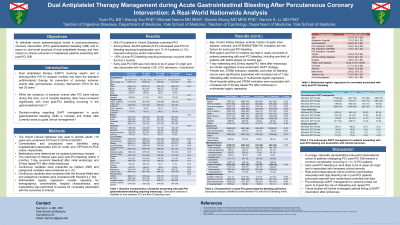Sunday Poster Session
Category: GI Bleeding
P0726 - Dual Antiplatelet Therapy Management During Acute Gastrointestinal Bleeding After Percutaneous Coronary Intervention: A Real-World Nationwide Analysis
Sunday, October 27, 2024
3:30 PM - 7:00 PM ET
Location: Exhibit Hall E

Has Audio

Darrick Li, MD, PhD
Yale School of Medicine / Connecticut GI
New London, CT
Presenting Author(s)
Yuan Pu, BS1, Michael Nanna, MD1, Dennis Shung, MD, PhD1, Darrick Li, MD, PhD2
1Yale School of Medicine, New Haven, CT; 2Yale School of Medicine / Connecticut GI, New London, CT
Introduction: Dual antiplatelet therapy (DAPT) involving aspirin and a thienopyridine P2Y12 receptor inhibitor represents the mainstay of treatment for prevention of coronary ischemic events after percutaneous coronary intervention (PCI). Decision-making regarding DAPT management in acute gastrointestinal bleeding (GIB) is complex and limited data exists to guide clinical management. In this study, we explored real-world observational data pertaining to ischemic and bleeding outcomes stratified by pre-endoscopic dual antiplatelet management to help inform best practices.
Methods: The Vizient Clinical Database was used to identify adults ≥18 years who underwent PCI from January 1, 2016, to June 30, 2023, and were subsequently hospitalized for GIB. The prescribing patterns for DAPT before and after endoscopy were identified based on inpatient pharmacy receipts. The co-primary outcomes were recurrent bleeding (within 7 days) and major adverse cardiovascular events (within 30 days). Multivariable logistic regression adjusting for demographics, select comorbidities, hospital characteristics, and medications was performed to assess for covariates associated with the primary outcomes.
Results: We identified 45,639 patients (median age 68, 65% male, median time from PCI 284 days) who were hospitalized for GIB after PCI. 11,837 developed GIB within 12 months of PCI and underwent endoscopy. Holding aspirin prior to endoscopy occurred in 64% of patients and holding both aspirin and the P2Y12 agent was the most common strategy employed (54%) prior to endoscopy. After adjusting for covariates, academic hospitals were associated with decreased odds of this prescribing pattern. 22.6% of individuals in our cohort developed recurrent bleeding and 9.0% developed MACE after their index GIB. Holding aspirin was associated with higher odds of 30-day MACE and comparable odds of 7-day rebleeding compared to DAPT management strategies in which aspirin were continued.
Discussion: In a large, nationally representative cohort of patients with post-PCI GIB, pre-endoscopic DAPT management involved holding aspirin occurred in nearly two-thirds of all patients and was associated with higher odds of MACE and similar odds of recurrent bleeding compared to strategies in which aspirin was continued. As such, efforts to ensure aspirin continuation in this setting represents an opportunity to improve the quality of inpatient care for these complex and medically comorbid patients.
Disclosures:
Yuan Pu, BS1, Michael Nanna, MD1, Dennis Shung, MD, PhD1, Darrick Li, MD, PhD2. P0726 - Dual Antiplatelet Therapy Management During Acute Gastrointestinal Bleeding After Percutaneous Coronary Intervention: A Real-World Nationwide Analysis, ACG 2024 Annual Scientific Meeting Abstracts. Philadelphia, PA: American College of Gastroenterology.
1Yale School of Medicine, New Haven, CT; 2Yale School of Medicine / Connecticut GI, New London, CT
Introduction: Dual antiplatelet therapy (DAPT) involving aspirin and a thienopyridine P2Y12 receptor inhibitor represents the mainstay of treatment for prevention of coronary ischemic events after percutaneous coronary intervention (PCI). Decision-making regarding DAPT management in acute gastrointestinal bleeding (GIB) is complex and limited data exists to guide clinical management. In this study, we explored real-world observational data pertaining to ischemic and bleeding outcomes stratified by pre-endoscopic dual antiplatelet management to help inform best practices.
Methods: The Vizient Clinical Database was used to identify adults ≥18 years who underwent PCI from January 1, 2016, to June 30, 2023, and were subsequently hospitalized for GIB. The prescribing patterns for DAPT before and after endoscopy were identified based on inpatient pharmacy receipts. The co-primary outcomes were recurrent bleeding (within 7 days) and major adverse cardiovascular events (within 30 days). Multivariable logistic regression adjusting for demographics, select comorbidities, hospital characteristics, and medications was performed to assess for covariates associated with the primary outcomes.
Results: We identified 45,639 patients (median age 68, 65% male, median time from PCI 284 days) who were hospitalized for GIB after PCI. 11,837 developed GIB within 12 months of PCI and underwent endoscopy. Holding aspirin prior to endoscopy occurred in 64% of patients and holding both aspirin and the P2Y12 agent was the most common strategy employed (54%) prior to endoscopy. After adjusting for covariates, academic hospitals were associated with decreased odds of this prescribing pattern. 22.6% of individuals in our cohort developed recurrent bleeding and 9.0% developed MACE after their index GIB. Holding aspirin was associated with higher odds of 30-day MACE and comparable odds of 7-day rebleeding compared to DAPT management strategies in which aspirin were continued.
Discussion: In a large, nationally representative cohort of patients with post-PCI GIB, pre-endoscopic DAPT management involved holding aspirin occurred in nearly two-thirds of all patients and was associated with higher odds of MACE and similar odds of recurrent bleeding compared to strategies in which aspirin was continued. As such, efforts to ensure aspirin continuation in this setting represents an opportunity to improve the quality of inpatient care for these complex and medically comorbid patients.
Disclosures:
Yuan Pu indicated no relevant financial relationships.
Michael Nanna: Heartflow – Consultant. Merck – Consultant.
Dennis Shung indicated no relevant financial relationships.
Darrick Li: Phathom Pharmaceuticals – Speakers Bureau.
Yuan Pu, BS1, Michael Nanna, MD1, Dennis Shung, MD, PhD1, Darrick Li, MD, PhD2. P0726 - Dual Antiplatelet Therapy Management During Acute Gastrointestinal Bleeding After Percutaneous Coronary Intervention: A Real-World Nationwide Analysis, ACG 2024 Annual Scientific Meeting Abstracts. Philadelphia, PA: American College of Gastroenterology.
